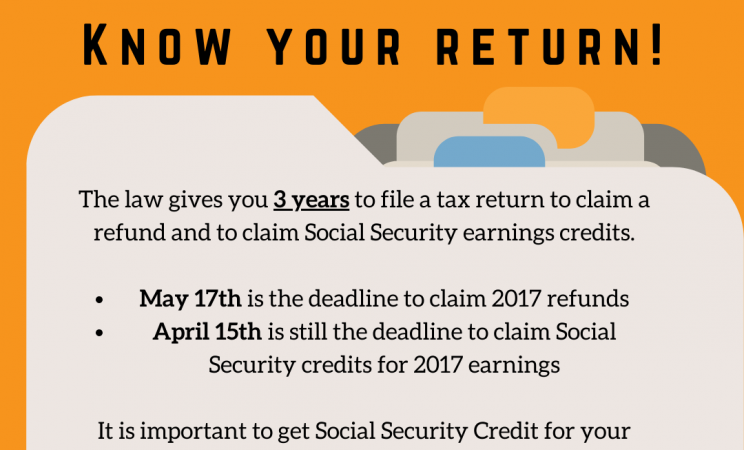3/15 deadline to claim 2017 refund, 4/15 for 2017 Social Security earnings

The law gives you 3 years to file a tax return to claim a refund and to claim Social Security earnings credits. Because of COVID-19, the IRS recently extended the deadline for claiming 2017 refunds to May 17th. Normally, April 15th of this year would be the last day to claim a refund for 2017 by filing a 2017 tax return or an amended 2017 tax return, because the law generally gives you 3 years to file a tax return to claim a refund and to claim Social Security earnings credits. BUT, the Social Security Administration has NOT extended the April 15th deadline for claiming earnings credits to go towards future retirement or disability benefits. That means that if you worked in 2017 and you got a 1099 instead of a W-2, or if you were just paid in cash and didn’t have any taxes taken out of your pay, then April 15th is still the deadline to report that income on a tax return for purposes of getting credits on your Social Security earnings record.
How do I know if I should file a 2017 return? Or amend my 2017 return?
If you worked in 2017 – at a job, at a gig, or for your own business – and your pay wasn’t reported on a W-2, you'll want to file by April 15th so you can get Social Security credit for those earnings. Similarly, if you had withholdings from wages or other 2017 payments that you didn’t claim, or if you didn’t claim all of your dependents in 2017, you can file a return or an amended return to claim those refunds.
For instance, if you made $20,000 from driving for Uber or Lyft or doing some other gig work in 2017 and never filed a 2017 tax return, you will not get retirement or disability credit for those earnings from Social Security unless you file a 2017 tax return reporting that income by April 15th. Or, if you had your own business in 2017 but didn’t file a personal tax return reporting your net business income, you won’t get Social Security credit for those earnings. It’s the same if you didn’t file a 2017 tax return and you were an employee, but your employer misclassified you and gave you a 1099 instead of a W-2.
Even if you did file a 2017 tax return, if you didn’t report earnings for which you didn’t get a W-2, then you need to file an amended 2017 tax return by April 15th to get Social Security credit for those earnings.
Why is filing a 2017 return important?
It is important that you get Social Security credit for your earnings! And even one year could make a difference! You could be denied disability or retirement benefits if you don’t qualify for them without having those earnings credits from 2017! You can see your current Social Security earnings record by making an account with the SSA: https://www.ssa.gov/myaccount/
If you didn’t file a 2017 tax return, you might also be at risk of losing a tax refund for that year! Refunds usually come from claiming taxes that were withheld from your wages or from other payments that you received (like retirement withdrawals, social security, and unemployment) and from claiming the Earned Income Tax Credit and the Additional Child Tax Credit. If you don’t have all your W-2’s and 1099’s from 2017, there is still time to get your 2017 Wage & Income transcripts from the IRS. https://www.irs.gov/individuals/get-transcript
You might be able to claim a refund. If you didn’t file a tax return for 2017 but taxes were withheld from your wages or other income and/or you worked and lived with your children, siblings, or nieces and nephews, you may be able to claim a refund. Even if you did file a return, if for some reason you didn’t claim all of your dependents, you may be able to file an amended return for 2017 to claim a refund.
Your Earned Income Tax Credit and the Additional Child Tax Credit can go up if you make more money! That means that even if you filed a 2017 tax return and claimed all of your dependents, if you forgot to report some income on that return, you might be entitled to an additional refund to what you originally got.

